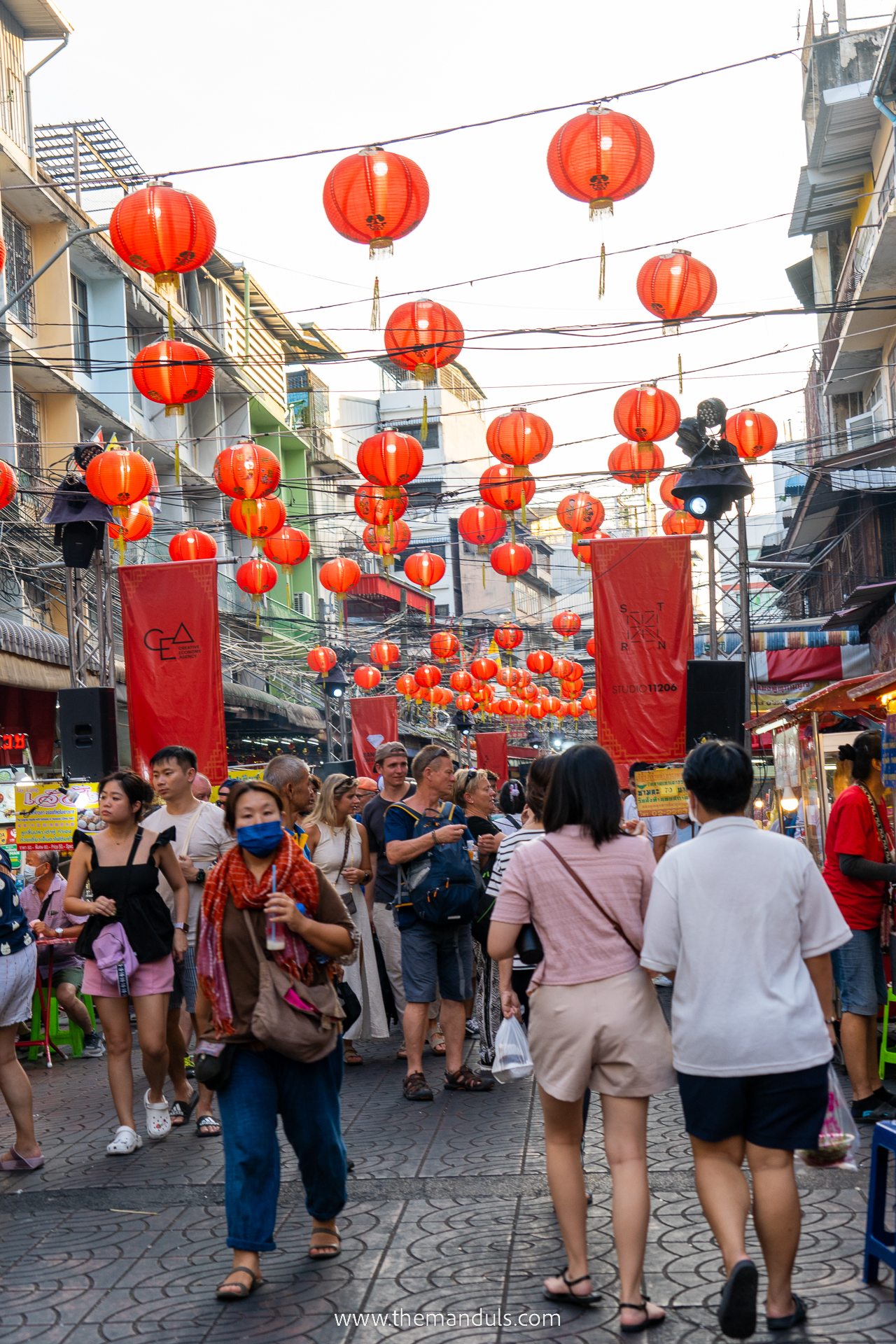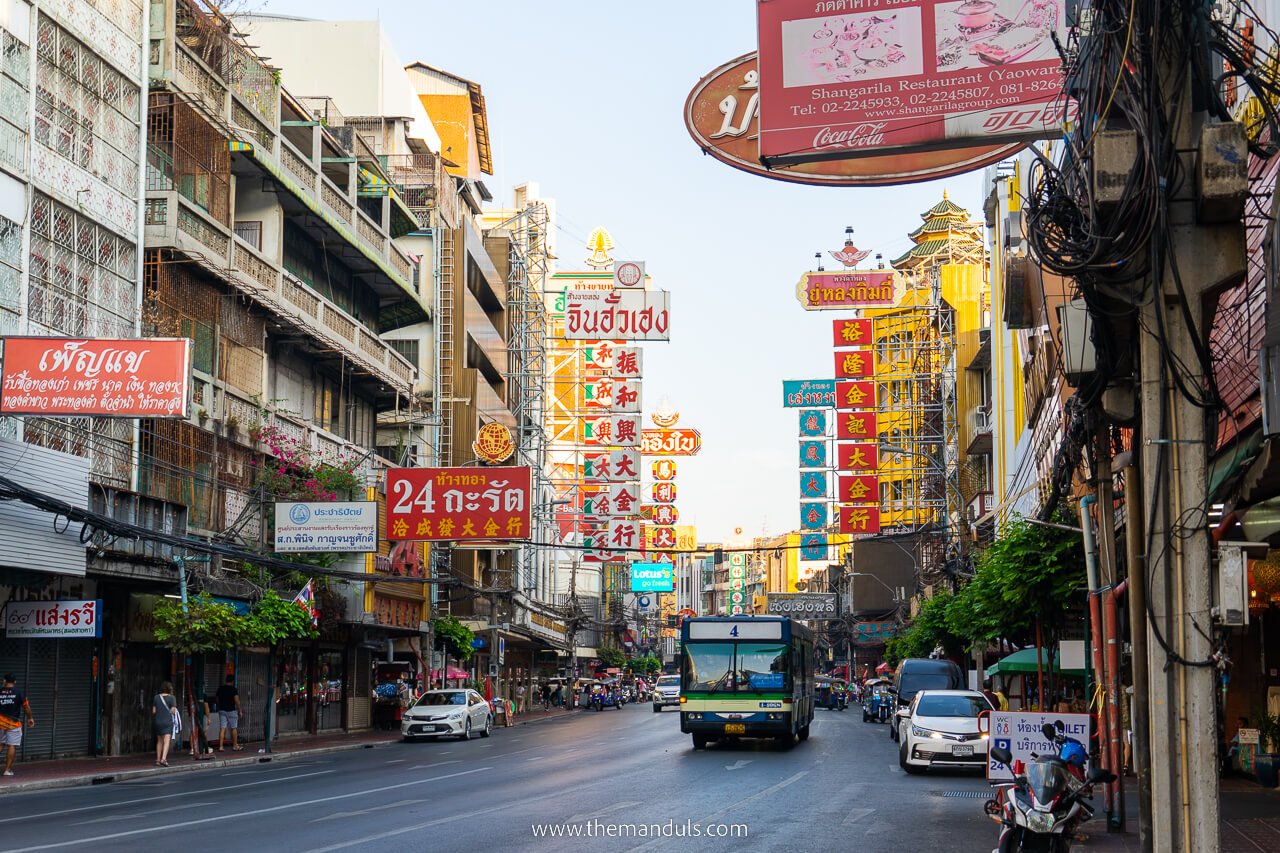This article contains affiliate links. Learn more in our affiliate disclosure.
Planning a trip to Chinatown in Bangkok, Thailand, feels a bit like stepping into another world — one filled with neon lights, sizzling woks, and the hum of endless scooters weaving through narrow streets.
When we finally explored it ourselves, we quickly learned that timing makes all the difference.
During the day, it’s a lively mix of markets, gold shops, and traditional eateries, but once the sun goes down, the whole area transforms into a buzzing street-food paradise.
In this guide, we’ll share the best things to do in Chinatown, when to visit for the perfect vibe, and a few tips we wish we’d known before going.
Why we think it’s worth it?
If you’re wondering whether it’s worth spending time in this part of Bangkok, we’d say absolutely. The vibe is incredible — especially after sunset when the streets truly come alive. The energy is somewhat similar to Khao San, but without the party vibe.
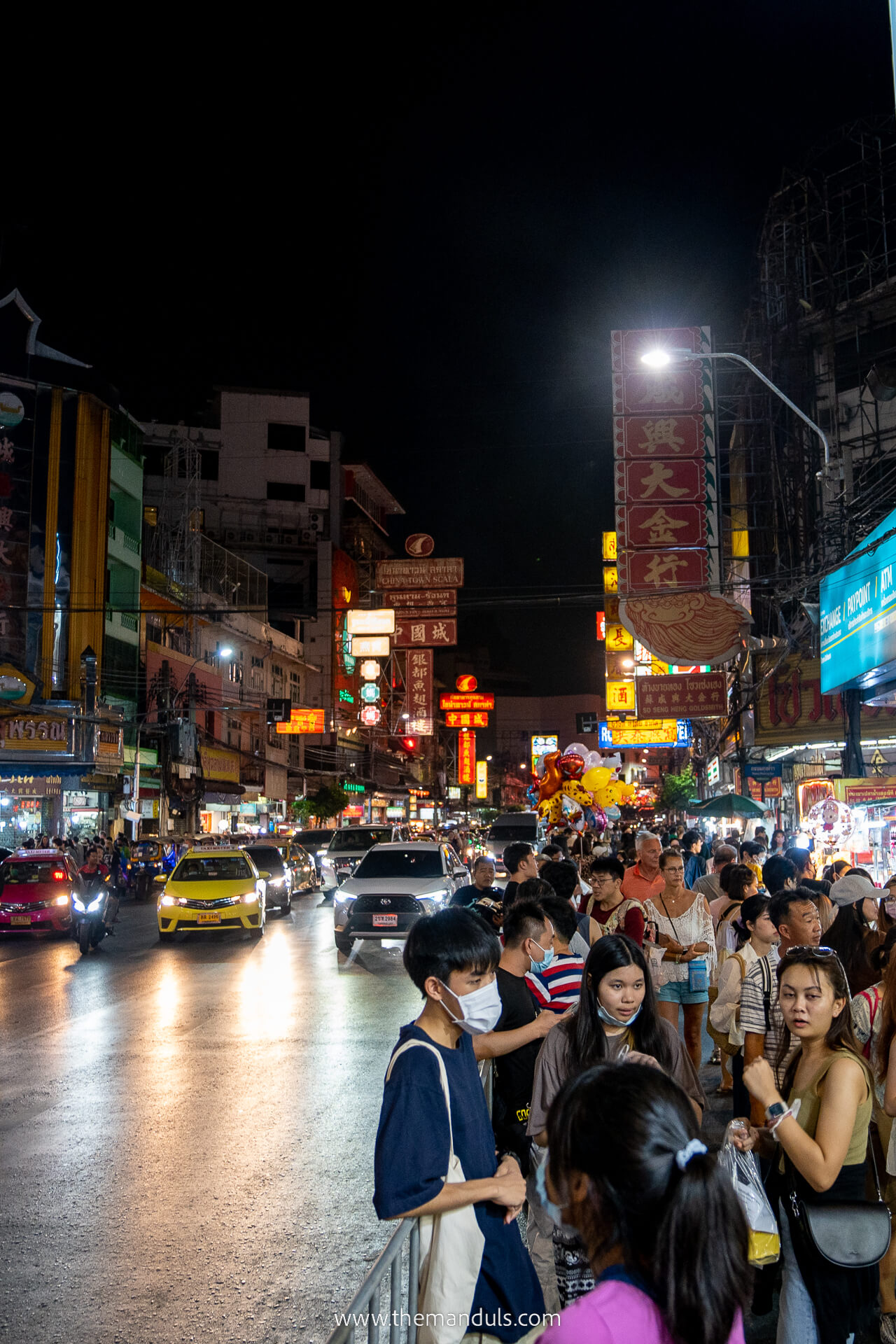
It’s also a must-visit for foodies. We didn’t even know where to start with all the stalls — from sizzling seafood to fresh mango sticky rice, every corner had something tempting.
But what we loved the most? Just wandering around at night, with neon lights glowing above us.
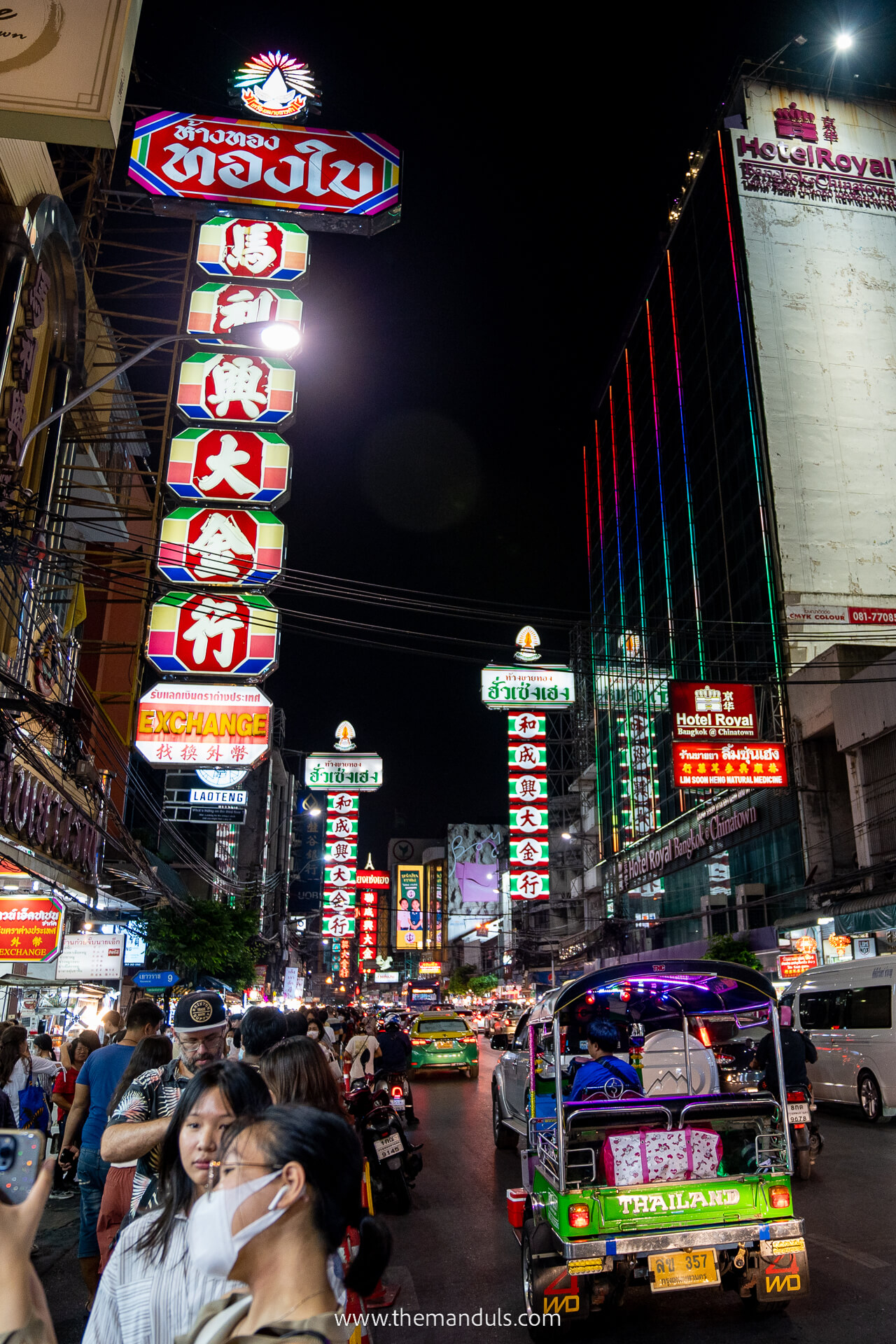
In a hurry?
These are our top hotels in Chinatown we’d book again
⭐️⭐️⭐️ The Mustang Blu – Our top pick. Boutique hotel in a restored heritage building with dramatic interiors, high ceilings, and a stylish atmosphere right by Yaowarat Road.
👉 See prices & availability →
⭐️⭐️ The Unforgotten B&B – Cozy mid-range stay on a quiet street near Chinatown’s food scene, with bright rooms and a friendly, local feel.
👉 See prices & availability →
⭐️ Pipp Residence – Simple, modern rooms just steps from Yaowarat Road — ideal if you want to stay central without overspending.
👉 See prices & availability →
How to get to Chinatown
- MRT – Take the blue line to Wat Mangkon.
- By boat – Take the Chao Phraya Express boat to Ratchawong Pier for the most scenic route.
- Grab – A flexible choice, we loved using GrabBike to explore Bangkok.
- Tuk-tuk – Also an option, but make sure to agree on a fare before the ride.
- By bus – Use Google Maps’ public transport option to see which lines to take.

Top Things to do in Chinatown Bangkok
Map of all the attraction
1. Walk Down Yaowarat Road
Yaowarat Road is the heart of Chinatown, and walking down this busy stretch is the best way to take it all in.
If you come during the day, it’s a bit calmer, but after sunset, the whole street transforms. Vendors set up their stalls, the sidewalks get crowded, and the energy skyrockets.
The first time we came here, we were a bit overwhelmed — in the best way. Bright neon signs everywhere, tuk-tuks weaving through traffic, and the smell of tasty food filling the air. It’s chaotic, loud, and absolutely fascinating.
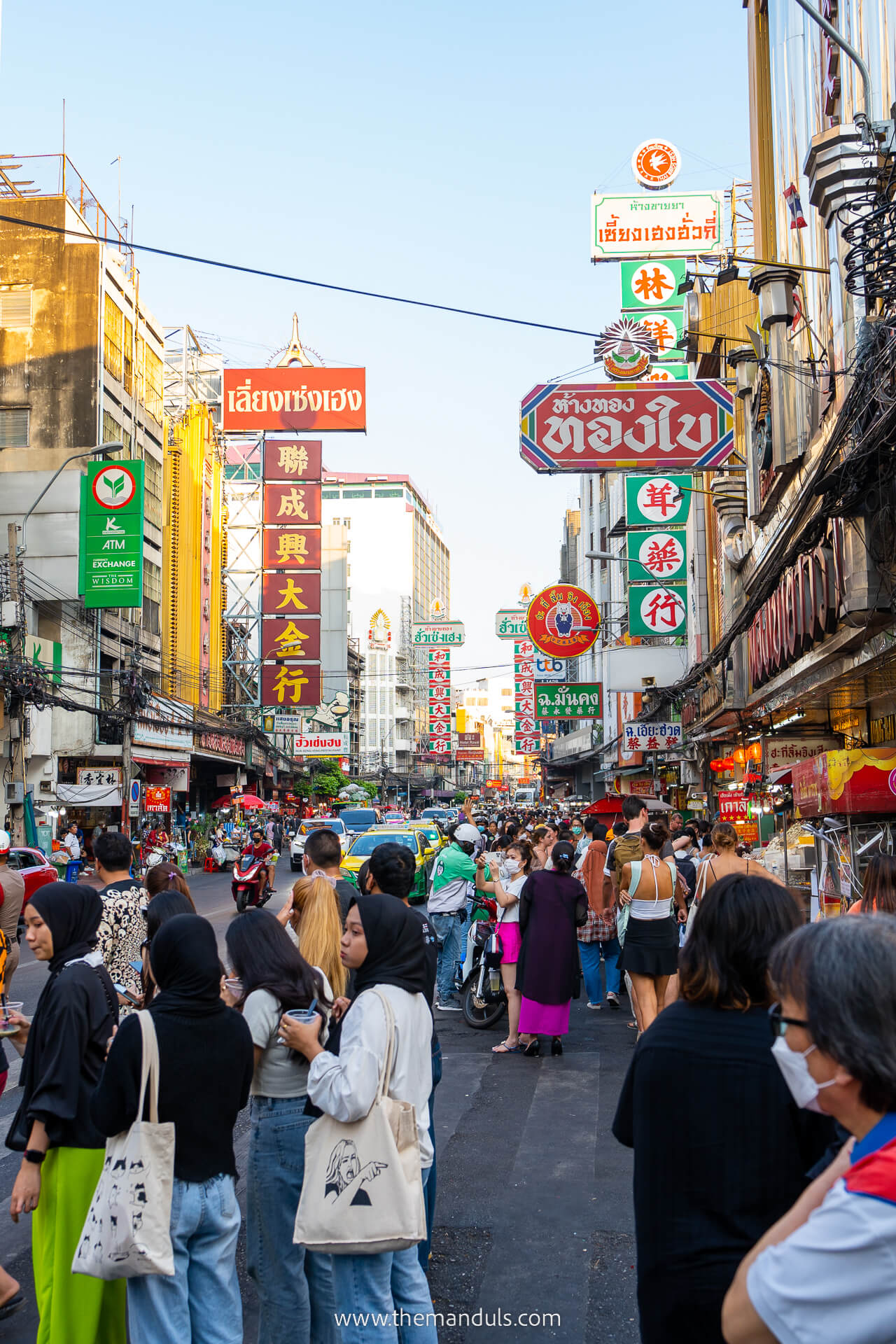
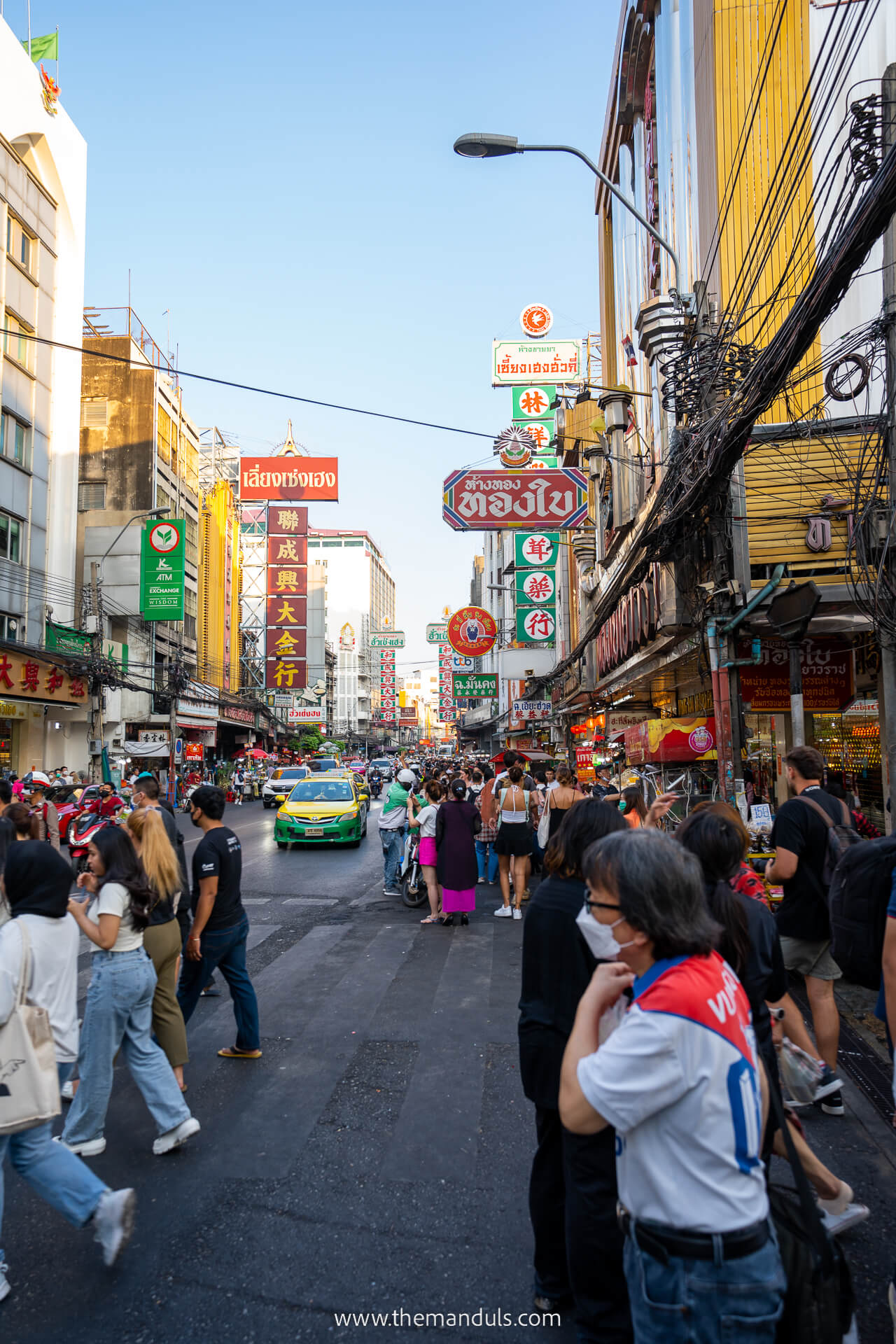
2. See Iconic Chinatown Gate
Right at the entrance to Yaowarat Road, you’ll spot the famous Chinatown Gate, also called the Odeon Gate.
It’s one of those spots you can’t miss — a bright red and gold arch that looks even better when it’s lit up at night.
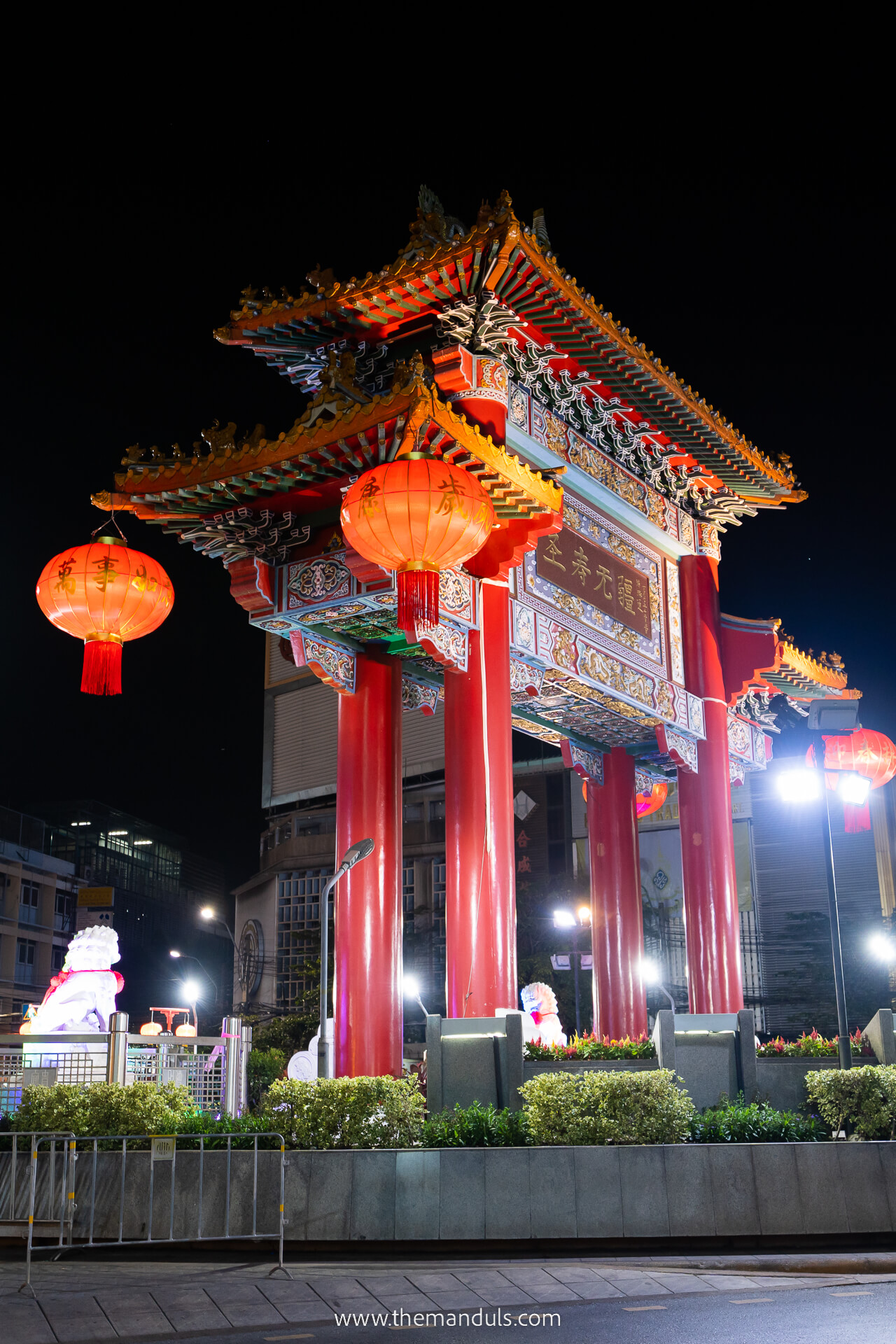
3. Explore the Bustling Night Market
Whenever we hear the words “night market,” our eyes light up with excitement. Being from Europe, where this kind of thing just doesn’t really exist, it’s easily one of our favorite things to do in Bangkok. And honestly, Chinatown’s night market might just be the best one in the city.
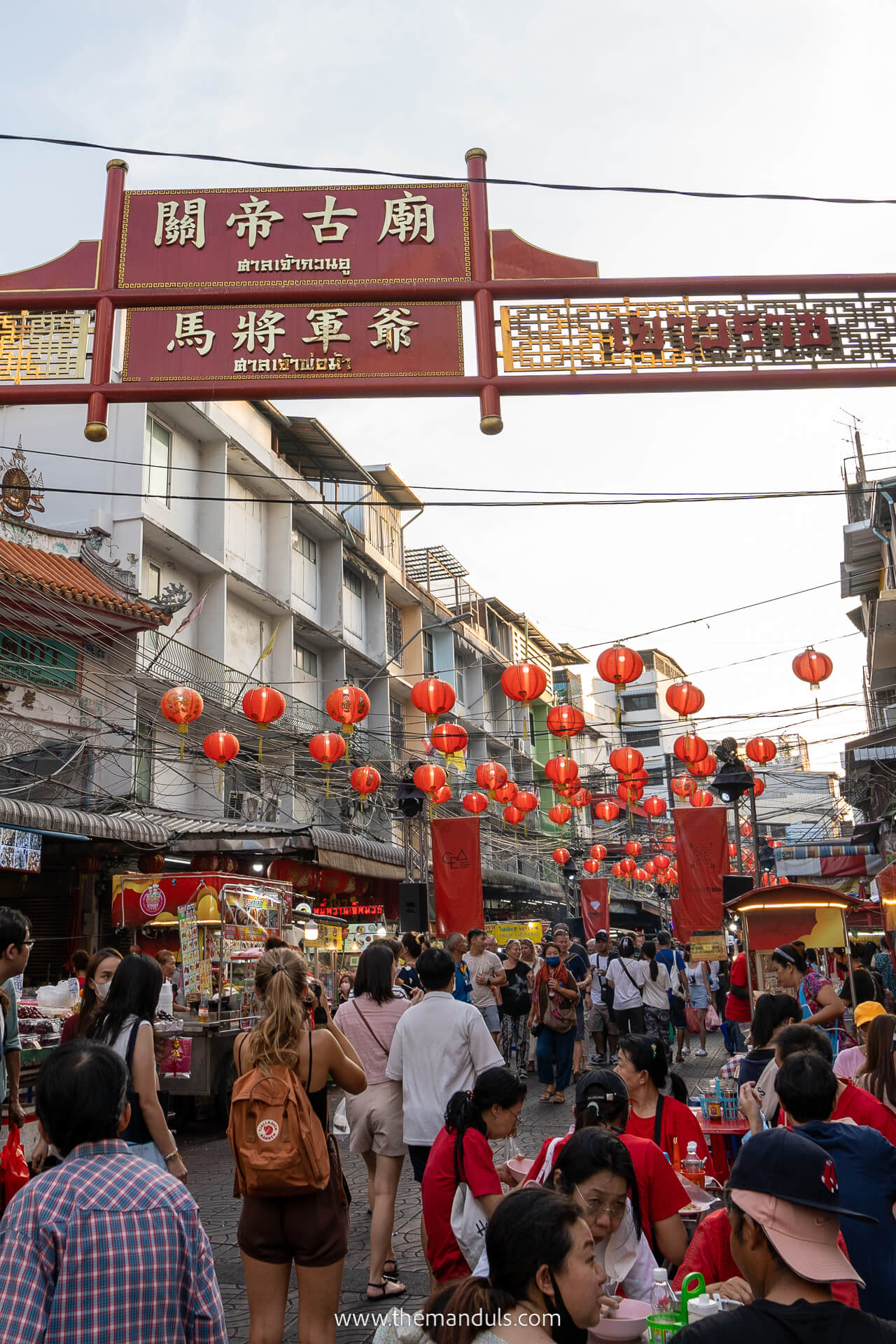
The vibe here is different from other spots like Khao San — still lively and full of energy, but with a calmer, more authentic feel. We loved just wandering around, soaking up the sounds and smells, and deciding which stall to try next.
The market stretches along Yaowarat Road, and we also recommend heading to the small side street Soi Yaowarat 11 — it’s decorated with lanterns and makes for a lovely detour.
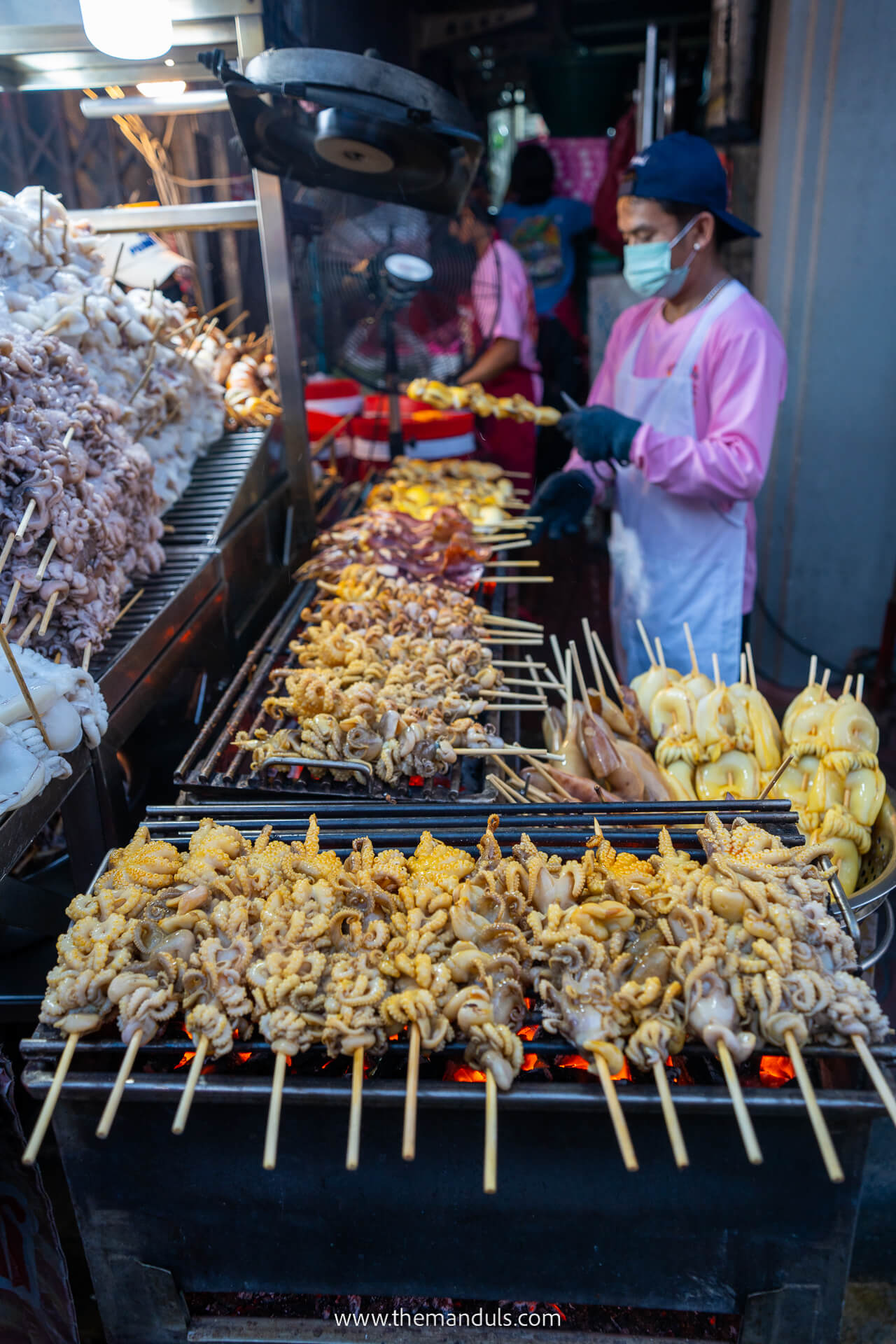
4. Eat Your Way Through the Best Street Food
There’s no shortage of incredible food here. You’ll find steaming bowls of Kway Chap — a peppery pork soup that’s perfect for a late-night bite, endless varieties of dumplings.
TIP: Guy Kao Grilled Squid is a very popular stall, but we wouldn’t recommend giving it a try – the squid is not fresh, chewy, and the taste is not good either. Some people mention they even got food poisoning here.
But if I had to pick just one thing, it would be a simple wonton soup— comforting, flavorful, and my personal favorite.

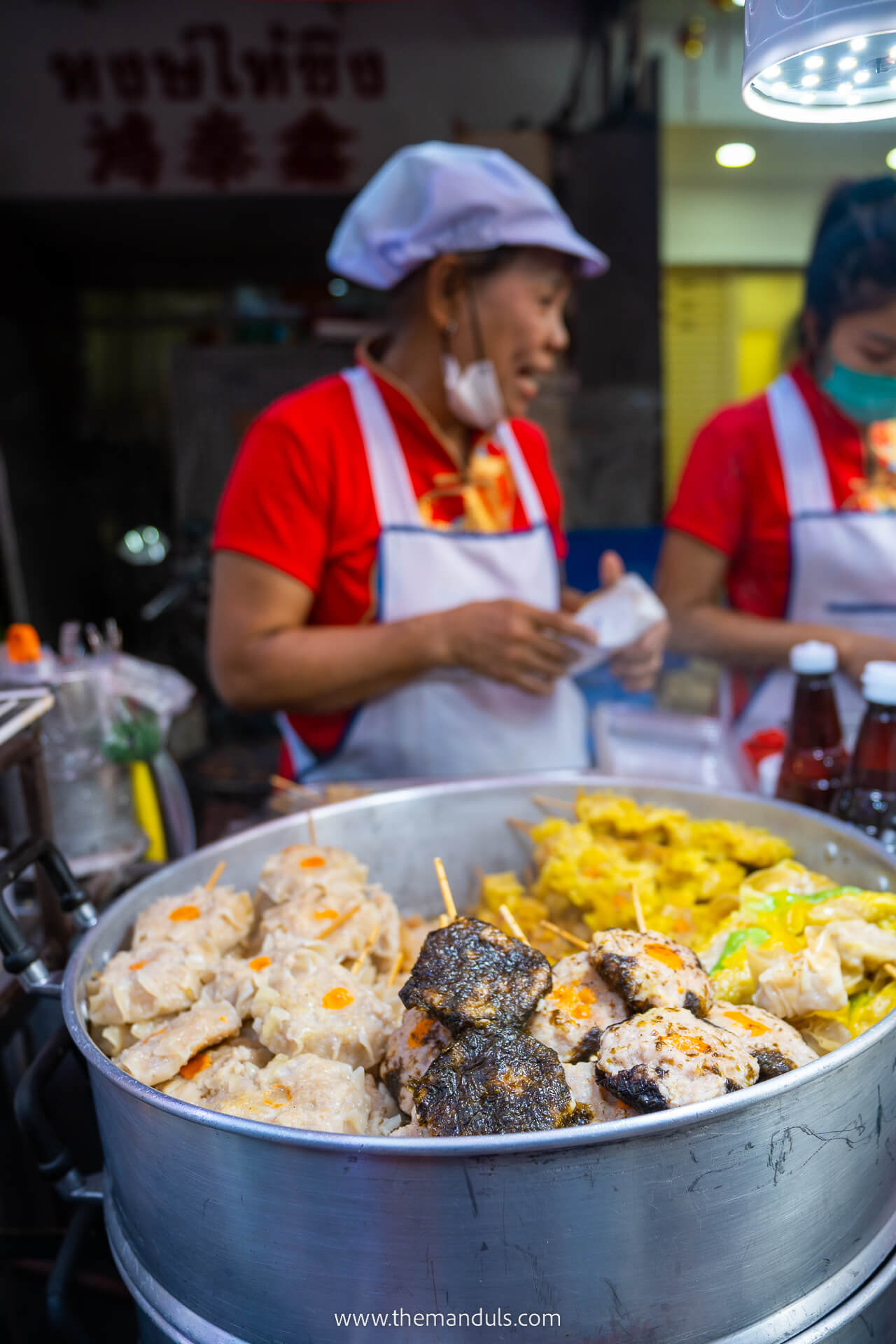
5. Get Lost in Chinatown’s Hidden Alleys
One of the best things about Chinatown is what you find when you step away from the main road.
Just duck into one of the side alleys, and suddenly you’re in another world — quiet, narrow lanes lined with shophouses, tiny family-run stalls, and old workshops that feel frozen in time.
These alleys are where you feel the character of Chinatown — the everyday life of locals without the influence of mass tourism.
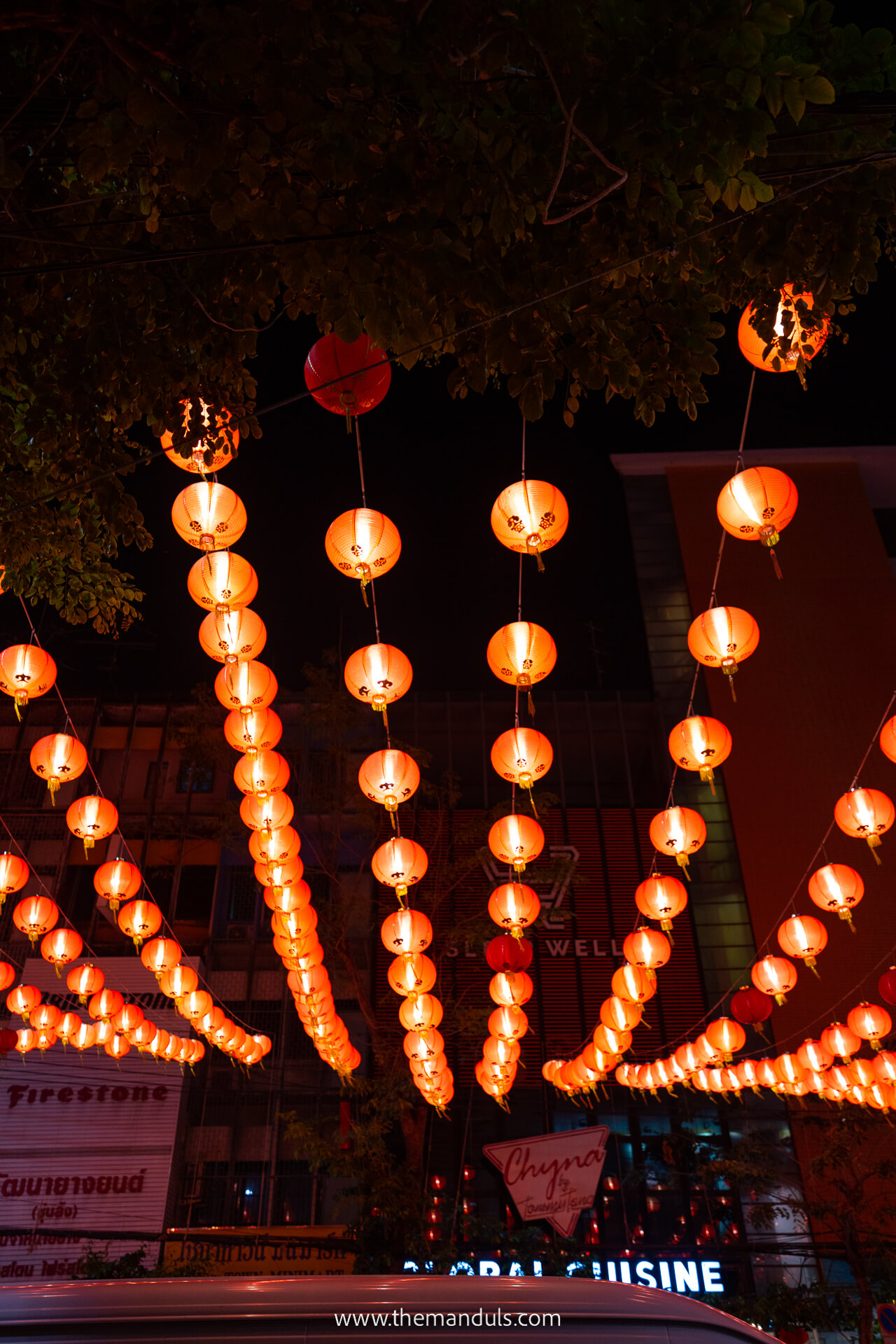
6. Visit Wat Mangkon Kamalawat – The Dragon Lotus Temple
Entrance Fee: free
Opening hours: 08:00 – 16:30
If there’s one temple you shouldn’t miss in Chinatown, it’s Wat Mangkon Kamalawat, also known as the Dragon Lotus Temple. It’s the most important Chinese Buddhist temple in Bangkok and a spiritual hub for the local community.
The temple is famous for its beautiful Chinese-style architecture — think intricate carvings, colorful dragons curling across the roof, and bright red lanterns hanging all around.
The smell of incense fills the air, and you’ll often see locals praying, lighting candles, or leaving offerings, which adds to the temple’s authentic atmosphere.
Another wonderful temple in Bangkok we recommend visiting is the Golden Mount (Wat Saket).
7. See the Golden Buddha at Wat Traimit
Entrance Fee: 100 THB
Opening hours: 08:00 – 17:00
Just a short walk from the main streets of Chinatown, Wat Traimit is home to one of Bangkok’s most incredible treasures — the Golden Buddha. This massive statue is made of solid gold, weighs around 5.5 tons, and is said to be the largest of its kind in the world.
What’s fascinating is its story: for centuries, the statue was covered in plaster to protect it from invaders. It wasn’t until the 1950s, during renovations, that workers accidentally chipped away the outer layer and revealed the gold underneath.
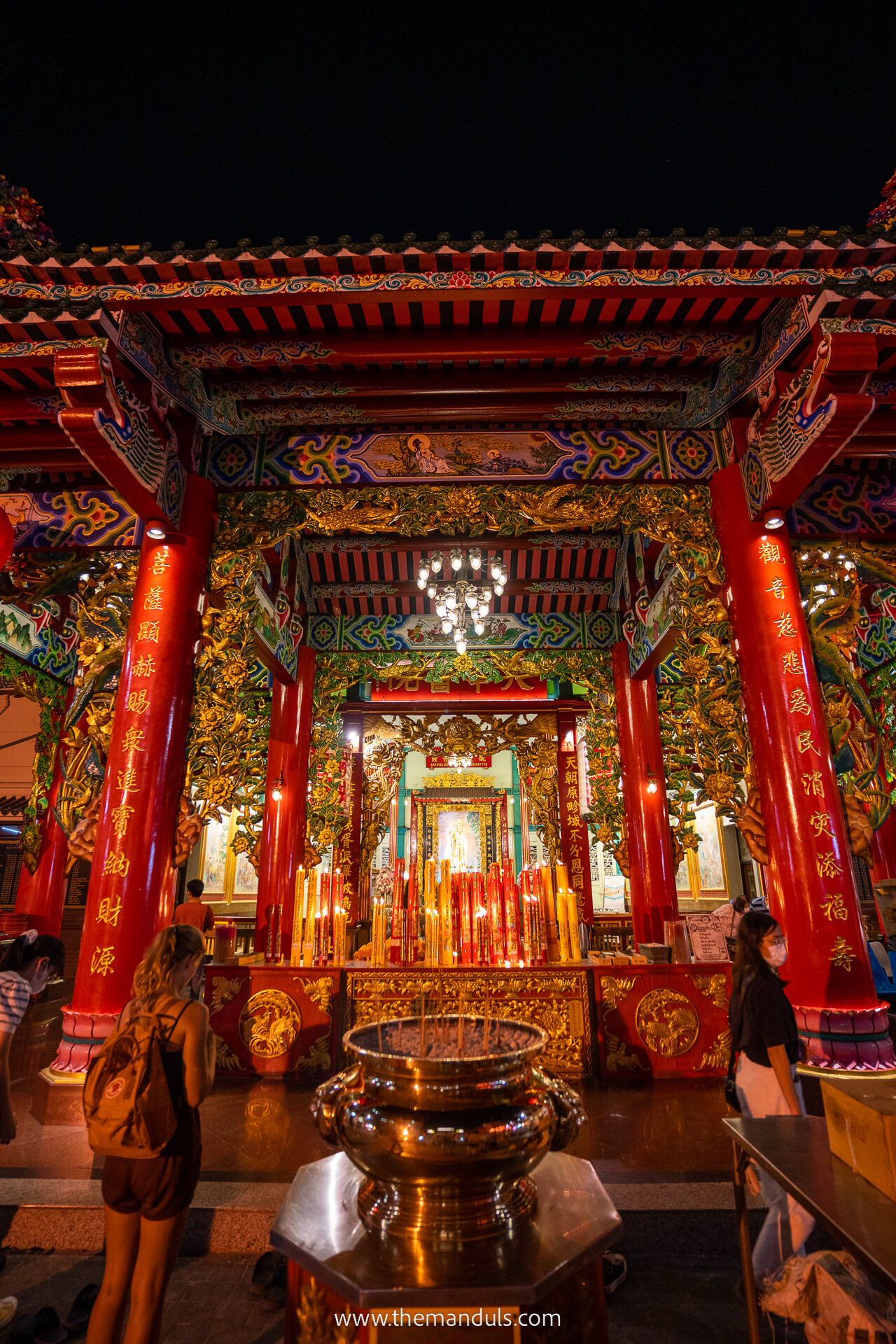
8. Go shopping at Sampeng Market
We wandered through Sampeng Market thinking we’d find something to buy, but quickly realized this isn’t your typical tourist market like Chatuchak Weekend Market. Instead, it’s more of a classic local market, filled with everyday essentials and a lot of wholesale shops.
It’s busy, a bit chaotic, and fascinating to walk through, but unless you’re looking for bulk fabrics, accessories, or household items, you probably won’t end up buying much here.
Still, it’s worth a stop if you want to see a slice of local life and experience the hustle and bustle of a traditional Bangkok market.
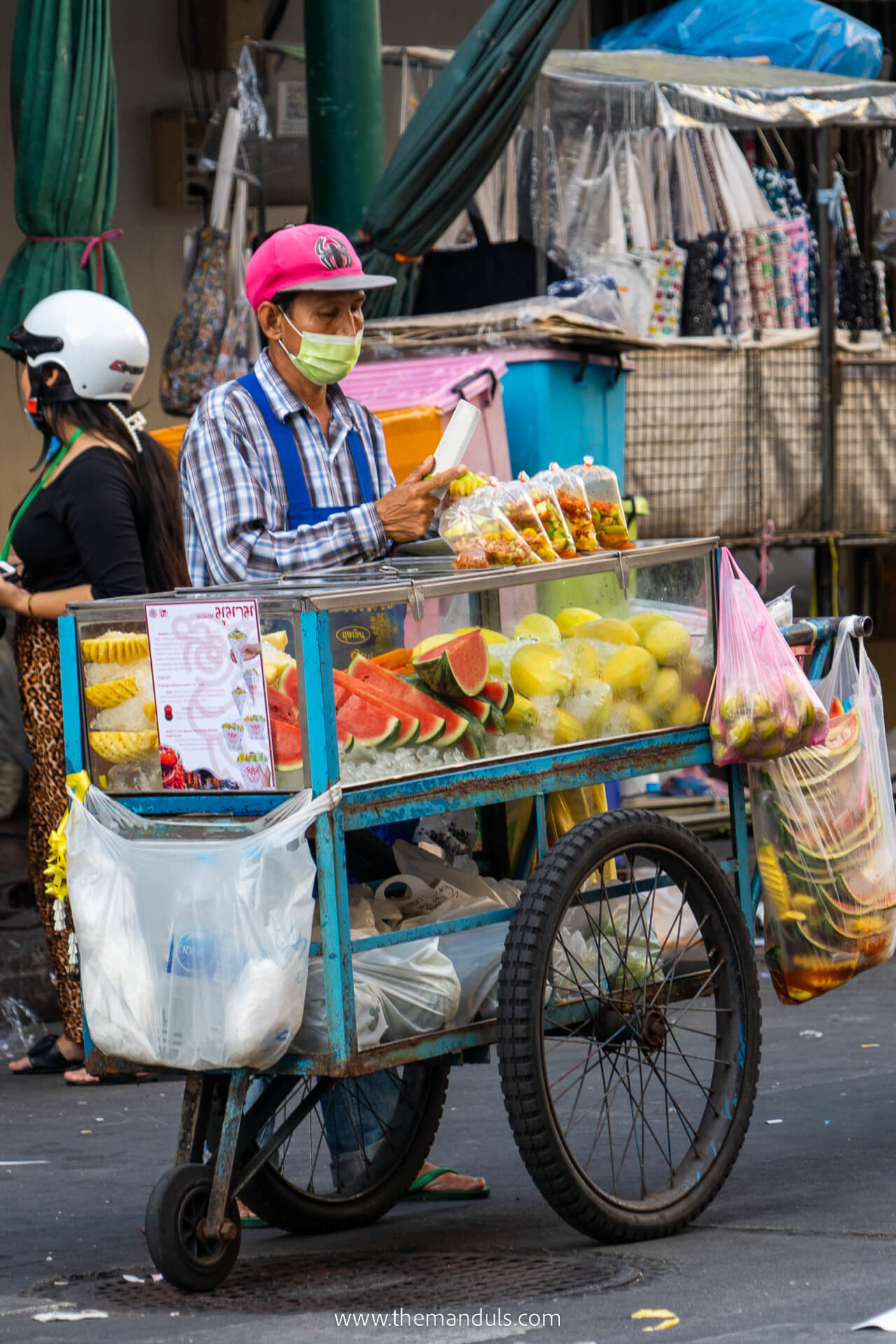
9. Street Art in Talat Noi
If you’ve got some extra time in Chinatown, take a little walk over to Talat Noi. It’s a super cool neighborhood where old shophouses meet colorful street art — the kind of place that makes you want to stop every few steps to snap a photo.
The alleys here are narrow and quiet, and you’ll find murals painted on old walls, rusty doors, and random corners. Some are playful, others a bit artsy, but together they make the area feel like a hidden, open-air gallery.
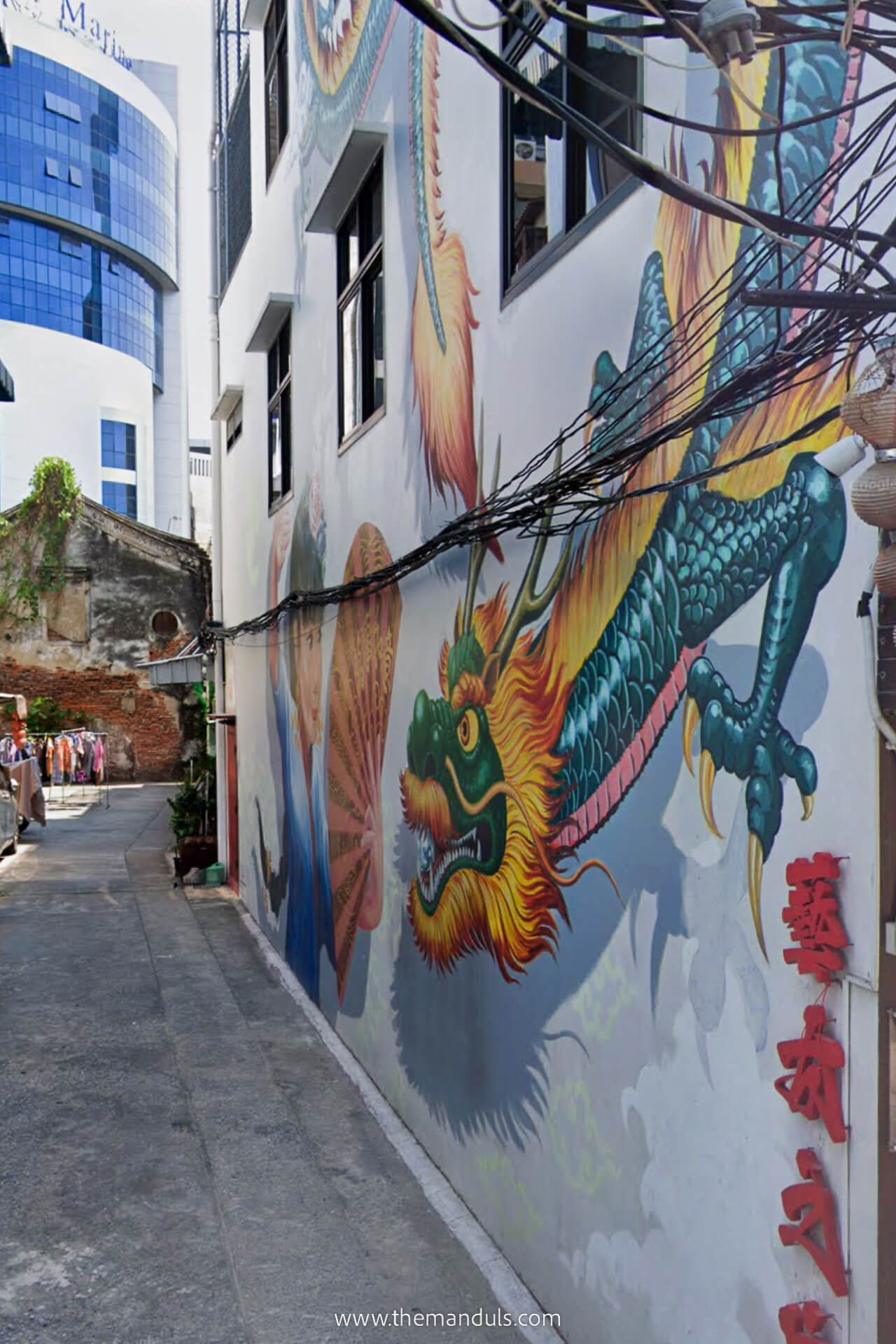
10. San Chao Mae Guan Yin Shrine
We didn’t plan to visit this shrine, but it caught our attention as we were walking toward the Chinatown Gate. The entrance looked so inviting, with its traditional red and gold details, that we couldn’t resist stepping inside for a quick look.
It’s a small but beautiful Chinese shrine dedicated to Guan Yin, the Goddess of Mercy. The air smells of incense, and locals are quietly praying, which makes the place feel calm and peaceful despite being right by the busy street.
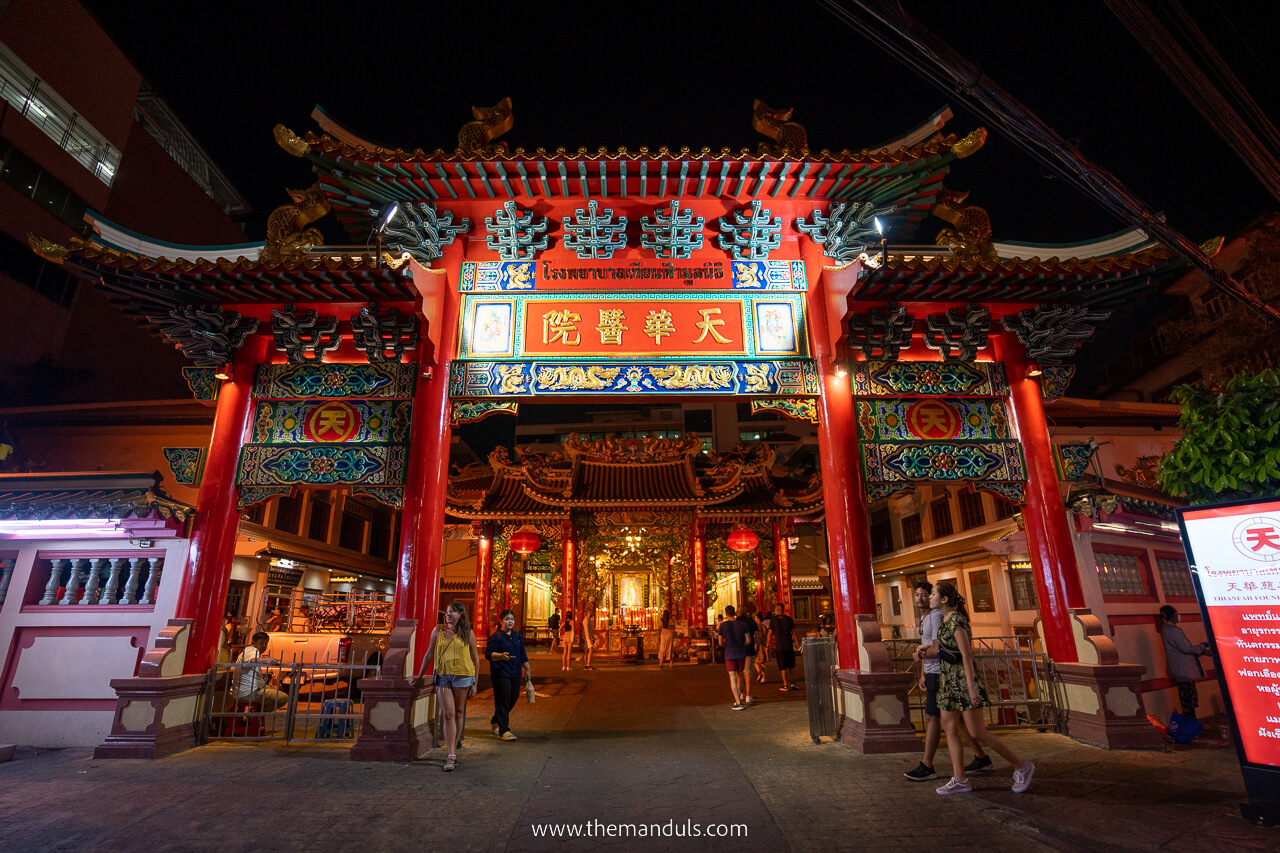
Where to Stay in Chinatown
If you’re visiting Bangkok’s Chinatown, staying nearby makes the experience even better — especially if you love food, night markets, and that lively, sensory mix of sounds and smells that defines Yaowarat Road.
The area is packed with boutique stays tucked inside old shophouses, design hotels in restored buildings, and a few modern options that still keep that local edge.
If you’re still deciding which part of Bangkok suits you best, check out our full guide on where to stay in Bangkok — it breaks down the best areas, including hand-picked hotel recommendations.
Here are the ones we’d happily book again:
⭐️⭐️⭐️ The Mustang Blu (our top pick) – A boutique stay inside a beautifully restored heritage building that perfectly fits Chinatown’s creative vibe. Think high ceilings, vintage details, and moody design that feels more like an art space than a hotel. It’s right on the edge of Yaowarat, so you can dive into the street food chaos and still retreat to calm luxury afterward.
👉 Check current deals →
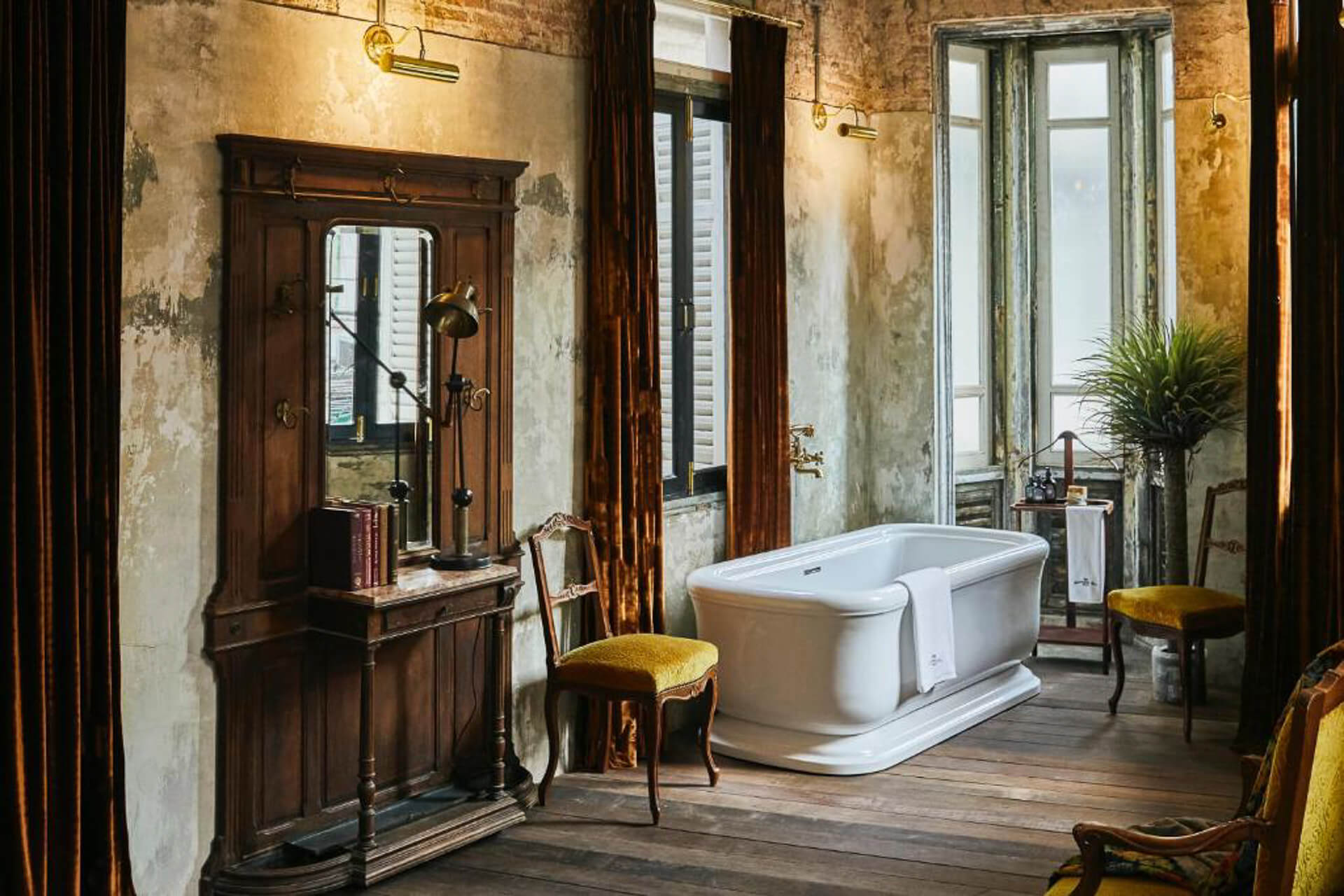
⭐️⭐️ The Unforgotten B&B – A charming mid-range stay tucked down a quiet street just a few minutes from the main Chinatown strip. The bright rooms, personal touches, and homely feel make it ideal if you want something authentic and welcoming. We haven’t stayed here yet, but it’s one we’d happily book next time for its location and character.
👉 Compare prices →
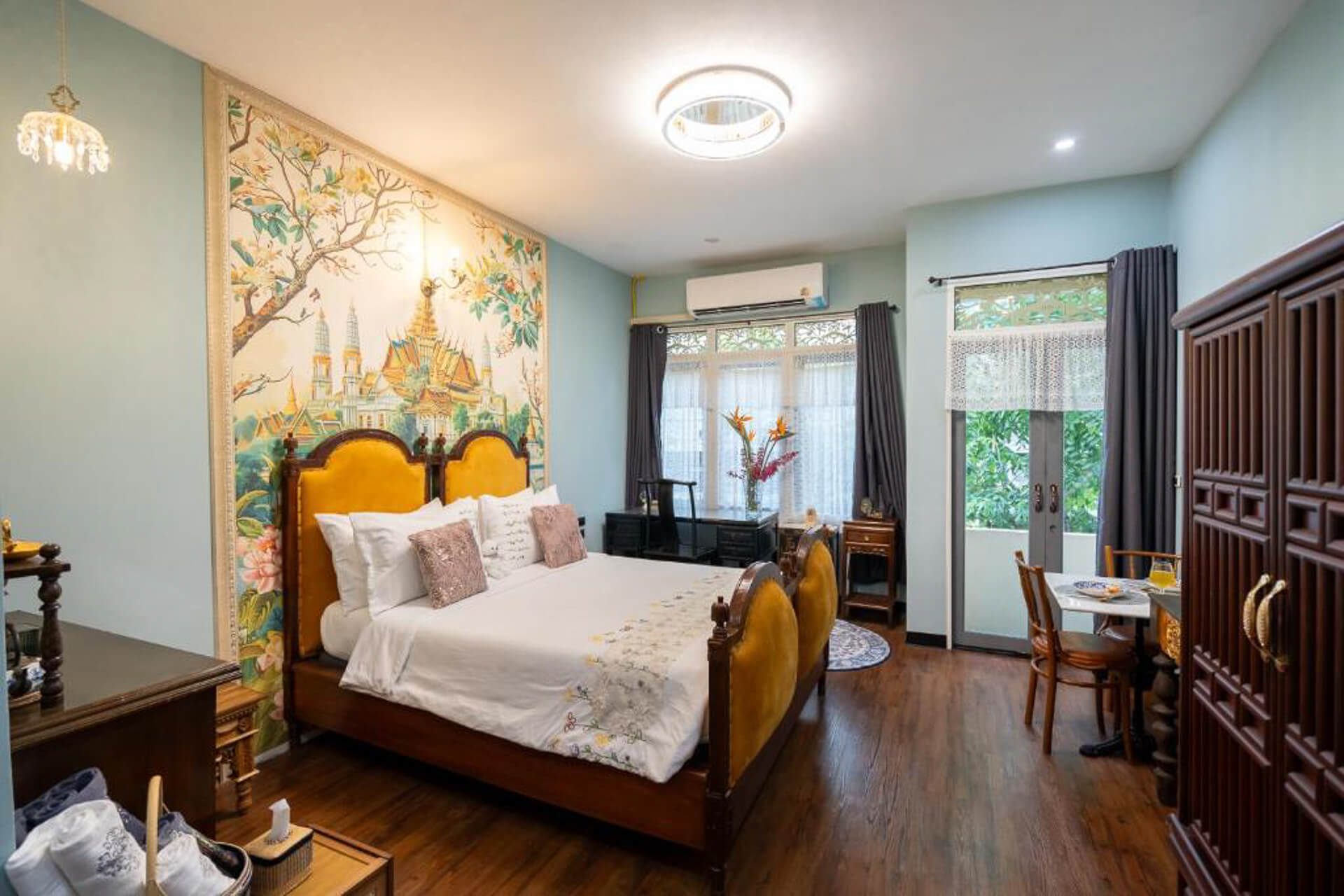
⭐️ Pipp Residence – A simple, modern hotel with clean rooms and unbeatable value for money. It’s only a short walk from Yaowarat Road, so you’re right in the heart of Chinatown but without the higher price tag. Perfect if you’re looking for a convenient, easy base.
👉 See availability →
Best time to visit Chinatown
From our experience, when you visit Chinatown makes a huge difference.
We came during the day and honestly… it felt a bit flat. Many stalls were closed, and the streets didn’t have that famous lively vibe. We thought we came to the wrong place.
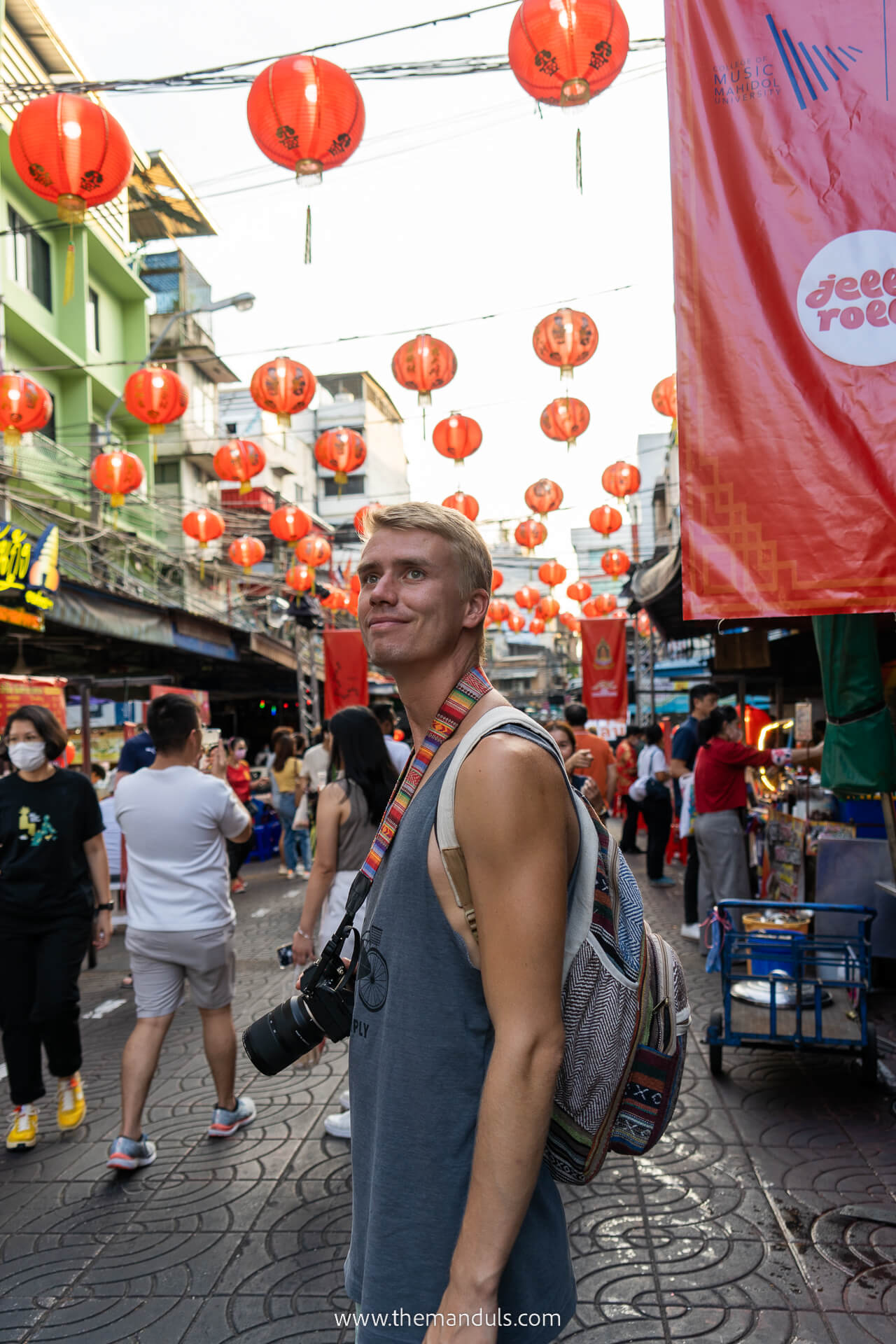
But late afternoon and evening, it’s a completely different story. The food stalls start setting up, the neon signs light up, and the whole area turns into a buzzing mix of smells, sounds, and colors.
If you want fewer crowds, head there around 5 PM, just as vendors are opening. For the full, chaotic experience, go after 7 PM — that’s when Chinatown is at its busiest (and most fun).
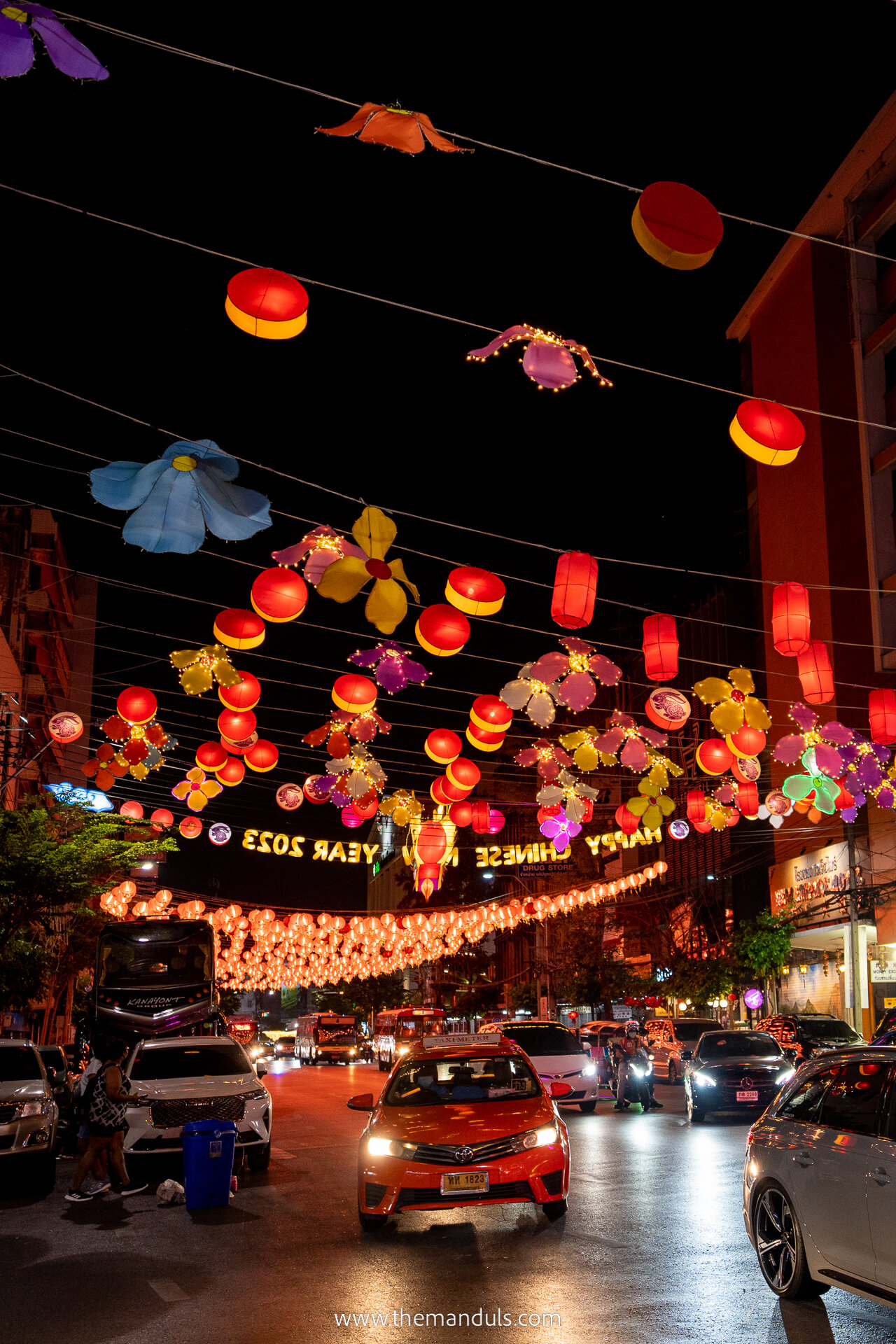
Final Thoughts
Chinatown in Bangkok is one of those places that really sticks with you. The mix of buzzing streets, incredible food, and little cultural gems makes it so much more than just a “quick stop.”
What stood out most to us was the energy — it’s busy, and there’s something exciting to discover around every corner, whether it’s a steaming bowl of wonton soup, colorful street art in Talat Noi, or a peaceful moment inside a hidden shrine.
If you’re planning your Bangkok itinerary, make sure to save at least one evening for Chinatown. Come hungry, take your time exploring the alleys, and don’t be afraid to try something new. Trust us — it’ll be one of your favorite memories from the city.
